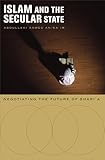Islam and the secular state : negotiating the future of Shari?a / Abdullahi Ahmed An-Naim.
Material type: TextPublication details: Cambridge, Mass. : Harvard University Press, 2008.Description: x, 324 p. ; 25 cmISBN:
TextPublication details: Cambridge, Mass. : Harvard University Press, 2008.Description: x, 324 p. ; 25 cmISBN: - 9780674027763 (alk. paper)
- 0674027760 (alk. paper)
- 9780674034563 (pbk.)
- 0674034562 (pbk.)
- 297.272 ABD-I 963
- BP190.5.S35 N35 2008
| Item type | Current library | Collection | Call number | Status | Barcode | |
|---|---|---|---|---|---|---|
 Books
Books
|
PIPS Library | NFIC | 297.272 ABD-I 963 (Browse shelf(Opens below)) | Available | 963 |
Includes bibliographical references (p. 295-309) and index.
Introduction : why Muslims need a secular state -- Islam, the state, and politics in historical perspective -- Constitutionalism, human rights, and citizenship -- India : state secularism and communal violence -- Turkey : contradictions of authoritarian secularism -- Indonesia : realities of diversity and prospects of pluralism -- Conclusion : negotiating the future of Sharia.
"What should be the place of Sharia - Islamic religious law - in predominantly Muslim societies of the world? In this ambitious and topical book, a Muslim scholar and human rights activist envisions a positive and sustainable role for Sharia, based on a profound rethinking of the relationship between religion and the secular state in all societies." "An-Naim argues that the coercive enforcement of Sharia by the state betrays the Quran's insistence on voluntary acceptance of Islam. Just as the state should be secure from the misuse of religious authority, Sharia should be freed from the control of the state. State policies or legislation must be based on civic reasons accessible to citizens of all religions. Showing that throughout the history of Islam, Islam and the state have normally been separate, An-Naim maintains that ideas of human rights and citizenship are more consistent with Islamic principles than with claims of a supposedly Islamic state to enforce Shari'a. In fact, he suggests, the very idea of an "Islamic state" is based on European ideas of state and law, and not on Sharia or the Islamic tradition."--Jacket.
There are no comments on this title.
